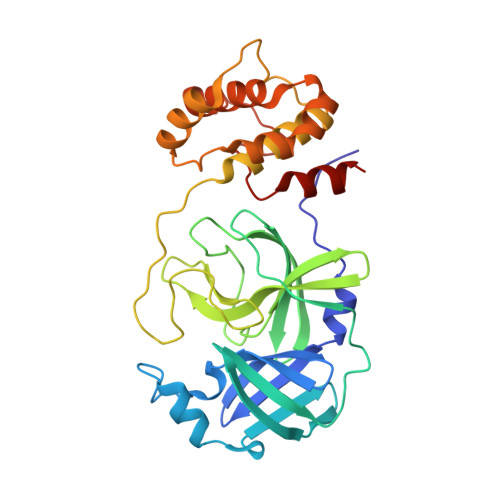Discovery of Highly Potent Noncovalent Inhibitors of SARS-CoV-2 Main Protease through Computer-Aided Drug Design.
Okabe, A., Carney, D.W., Tawada, M., Akther, T., Aida, J., Takagi, T., Dougan, D.R., Leffler, A.E., Bell, J.A., Frye, L., Hickey, E.R., Komandla, M., Tao, W., Selimkhanov, J., Yonemori, K., Chang, E., Saikatendu, K., Ochida, A.(2025) J Med Chem
- PubMed: 41076627
- DOI: https://doi.org/10.1021/acs.jmedchem.5c01199
- Primary Citation of Related Structures:
9DDF, 9DDG, 9NU6 - PubMed Abstract:
The COVID-19 pandemic has highlighted a clear need to ensure rapid and equitable global access to health interventions in preparation for future coronavirus-driven pandemics. Here, we report the discovery of highly potent noncovalent inhibitors of the severe acute respiratory syndrome coronavirus 2 (SARS-CoV-2) main protease (Mpro) with pan-coronavirus (pan-CoV) Mpro inhibition through computer-aided drug design. Virtual screening led to the identification of a noncovalent hit compound with a piperazine core. Structure-guided scaffold morphing provided a novel trisubstituted piperidine core. Free energy perturbation (FEP)-guided designs, with induced-fit of Met49/Met165 and Gln189, resulted in the identification of highly potent compound 30 , which exhibits pan-CoV Mpro inhibition and cellular antiviral efficacy against the SARS-CoV-2 omicron variant. The optimized lead compound 30 was characterized by in vitro ADME/Tox assays and in vivo mouse pharmacokinetics. These findings suggest that compound 30 could be an addition to the repertoire of tools used to support future pandemic preparedness.
- Takeda Pharmaceutical Company Limited, 26-1 Muraoka-Higashi 2-chrome, Fujisawa, Kanagawa 251-8555, Japan.
Organizational Affiliation:



















